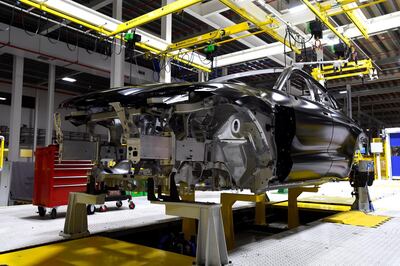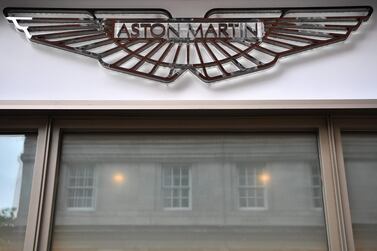Luxury car maker Aston Martin, the vehicle of choice for fictional British spy James Bond, was to reopen its factory in Wales on Tuesday as it pioneers efforts to restart manufacturing in Britain following the coronavirus shutdown.
Canadian billionaire Lawrence Stroll, the new chairman, has signalled that his most pressing objective is kick-starting manufacturing operations and, in particular, production of Aston Martin’s DBX, its first sports utility vehicle.
The company, which lost £100million in 2019, has high hopes for the DBX and believes the car could reverse its fortunes.
But Mr Stroll’s wish to “bring the organisation back to full operating life” may face bumps in the road. Workers returning to its plant in South Wales will have to follow to strict health and safety measures and social distancing guidelines as part of the “new normal” that could continue for months.

Most were laid off when production stopped in March and will now be expected to regularly wash their hands and ensure two-metre gaps in the workplace.
Workers at rival Bentley Motors have also returned. Chief executive Adrian Hallmark said on Monday that it would “almost” be business as usual if factory workers were able to move to one-metre gaps rather than two.
Experts said that automobile companies and manufacturers such as Aston Martin faced a difficult and uncertain time ahead amid plummeting demand and a global recession caused by the Covid-19 pandemic.
The UK’s motor industry trade association said weak demand for cars meant a difficult path ahead as it called upon the government to support the industry.
According to research by IHS Markit, Europe can expect a near 25 per cent fall in car sales as trade talks between the UK and the European Union and uncertainty on the CO2 fleet target timetable that was causing car companies a headache before the pandemic.
Our brilliant fans and customers make Aston Martin what it is.
— Aston Martin (@astonmartin) May 4, 2020
Over the past few weeks you’ve been sending us your best car designs and colouring in creations – thank you.
We’re all in this together.
(Can you spot yours?)#astonmartIN #KeepItParked pic.twitter.com/0R4a8E2ko5
“Planning is further plagued by varied containment restrictions across the region, and recovery strategies are a work in progress,” IHS said.
Colin Couchman, the executive director of global autos demand forecasting at IHS Markit, spoke of a difficult cycle of decline, stabilisation and recovery for car companies.
“The pandemic remains a clear and present danger to the autos sector, with months of uncertainty expected to cloud hopes for global recovery prospects,” he said.
IHS made comparisons to China, where Covid-19 was first reported and economic recovery is further along than Europe. Demand for cars was expected to remain low due to the wider macronecomic conditions while production beginning to creep up again.
The UK’s Society of Motor Manufacturers and Traders has struck a more positive tone to a degree, with chief executive Mike Hawes describing the sector as “fundamentally strong” but in desperate need of help.
“To get production lines rolling, we need a package of measures that supports the entire industry,” he said.

“This will include new workplace guidance, additional measures to ease cash-flow and help furloughed colleagues back to work, as well as demand-side measure to help encourage customers back into the market.”
It was hoped that the reopening of key export markets such as China and Germany could reinvigorate the sector.
There were, however, concerns about the wider manufacturing industry struggling to cope with company closures, weak demand and the problems faced by social distancing.
Stephen Phipson, chief executive of Make UK, the representative body for UK manufacturers, warned that looking forward “these are deeply worrying times” as he mentioned a collapse in demand.
“All the indications at the moment indicate that, even if a gradual easing of lockdowns begins soon, the impact of this shock will continue to hit companies and livelihoods for some time to come,” he said.
In a joint report, the Chartered Institute of Procurement & Supply and HIS Markit surveyed the substantial disruption caused in the UK manufacturing sector in April because of the public heath emergency.
Rob Dobson, a director at IHS Markit, warned uncertainty remained for companies such as Aston Martin because of questions over how long restrictions will remain. He warned the manufacturing industry would continue to be in dire straits the longer the lockdown remain.
“Supply chains also felt the full force of the outbreak as average supplier delays rose to the greatest extent seen since PMI records began. International goods flows were constrained by delays in air freight, shipping and border control issues, and staff shortages often limited production,” Mr Dobson said, as he warned of potential inflationary pressures. The PMI refers to the Purchasing Managers’ Index, which are used to assess economic trends.








